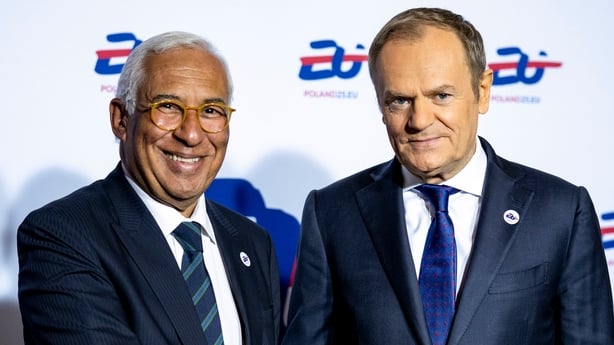Poland's six-month presidency of the Council of the European Union was officially launched yesterday evening at Warsaw’s Grand Theatre with a performance by musicians from the Polish National Opera.
The gala event, attended by Polish Prime Minister Donald Tusk and the President of the European Council António Costa, was broadcast live on Poland’s national broadcaster, TVP1.
Speaking at the event, Mr Costa said that Poland had become "a cornerstone of European defence" and a "key pillar" of the bloc’s single market.
He also said that Europe must continue to support Ukraine "for as long as it takes to achieve lasting peace".
Mr Tusk said that Poland would be a "guardian of solidarity" and referenced Poland’s pro-democracy Solidarity movement of the 1980s which began in his home city of Gdansk.
Defence and security policy is set out as a top priority in the Polish government's programme for the presidency, which has adopted the tagline "Security, Europe!".
"Europe is grappling with the consequences of Russia’s third year of armed aggression against Ukraine and the need to strengthen its own defence capacity," cites the official programme document.
"We need concerted and ambitious action on European defence, complementing the efforts of NATO."
Migration policy is also highlighted as a key priority, which the programme document labels as the "protection of people and borders".
"We will seek new solutions to comprehensively address the challenges of migration and security at the EU’s external borders, work to reduce irregular migration and strengthen the effectiveness of return policy, including in cooperation with third country partners," reads the programme document.
Mr Tusk’s coalition government has pursued a strict policy of limiting irregular migration along Poland's heavily militarised border with Belarus, essentially continuing a policy employed by the previous nationalist Law and Justice-led government.

Members of the Polish government and ambassadors also attended last night's gala event.
However, Hungary’s ambassador to Poland did not attend the ceremony amid an ongoing diplomatic spat between the two countries.
Last month, Hungary granted political asylum to Marcin Romanowski, a Polish member of parliament for the opposition Law and Justice party and a previous deputy minister of justice between 2019 and 2023.
Mr Romanowski faces 11 charges of misusing public funds from the justice ministry during his time as a deputy minister.
When Polish authorities discovered in early December that Mr Romanowski had travelled to Hungary to evade arrest, they issued a European arrest warrant for him which remains in force.
Yesterday Polish deputy minister for European Affairs Magdalena Sobkowiak-Czarnecka confirmed in an interview with news channel TVP Info that Hungary’s ambassador to Poland was "not welcome" at the gala event.
The Polish presidency follows Hungary’s divisive six-month tenure, during which Hungarian Prime Minister Vitkor Orbán met Russian President Vladimir Putin in Moscow, much to the dismay of other EU leaders.
Polish President Andrzej Duda also did not attend last night's event and was instead represented by a high-ranking official from his office.
Mr Duda, whose political roots belong to Law and Justice, will complete his second and final term as president in May this year.
Relations between his presidential office and the prime minister’s office have been frosty since the formation of the current pro-EU coalition government in December 2023 and its efforts to reverse many of the rule-of-law changes enacted by the previous Law and Justice government.
Hundreds of Polish farmers protested outside the gala event in central Warsaw against the EU’s recent free trade agreement with South America’s Mercosur trade bloc, and also against the European Green Deal and imports of Ukrainian agricultural products.
More than 20 informal meetings of EU ministers will take place during the Polish presidency as well as more than 300 other official meetings at EU level.







